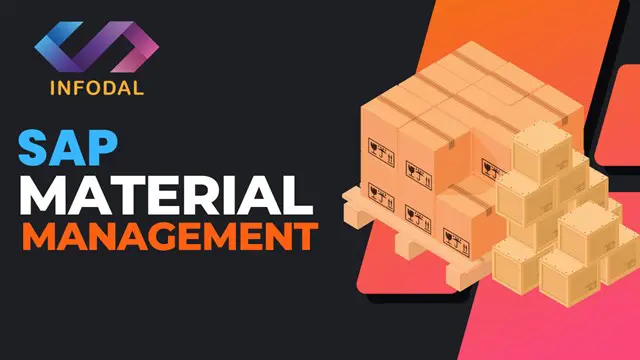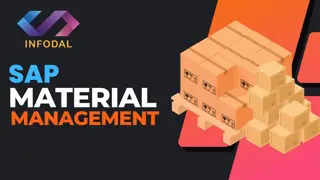
SAP Materials Management (MM)
Self-paced Videos, Full course with each topic covered in depth, Free Study Material, Course Completion Certificate
Infodal
Summary
- Certificate of completion - Free
- Reed courses certificate of completion - Free
- Tutor is available to students
Add to basket or enquire
Overview
Infodal offers training on SAP MM(Materials Management) module. This is video-based online course (self-paced training).
Material management, inventory control, and warehouse management are all aspects of the supply chain that the SAP MM (Material Management) Module assists in. It is a section of the logistical activities of SAP ECC, which are made up of a number of components and sub-components. Master Data, Purchasing, and Inventory are the most well-known and often utilized components.
The abbreviation for the SAP Material Management system is SAP MM. The following are the roles that SAP MM plays in a business process:
- In SAP, a business process is referred to as a "module."
- An organization's purchase activities can be managed with the use of SAP MM, which is a component of logistics operations.
- It backs up every element of material management (planning, control, etc.).
- With components including Sales and Distribution, Production Planning, Plant Maintenance, Project Systems, and Warehouse Management, it serves as the foundation of logistics.
The practice of material management makes sure there are never any material shortages or gaps in the organization's supply chain. The firm operates smoothly with total time and cost efficiency thanks to SAP MM's acceleration of the procurement and material management processes.
In order to increase efficiency and cut expenses, it deals with managing an organization's resources and materials (products and/or services). However, SAP MM is extremely adaptable to take into account changes that happen frequently in any corporate setting. The essential objective of SAP MM is to ensure that materials are constantly kept in appropriate amounts and without deficiencies or holes in the association's production network. It likewise assists supply with binding experts and other SAP clients complete the buying of products in an opportune and financially savvy way and to have the option to manage everyday changes in these cycles.
The Procurement Process, Master Data (Material & Vendor Master), Account Determination & Material Valuation, Inventory Management, Invoice Verification, Material Requirement Planning, etc. are all covered in this.
Curriculum
-
01. Introduction 44:48
-
02. Types of Purchasing Order 25:36
-
03. Real Time Implemaintation of Wokflow in SAP 59:27
-
04. Developing Organisation Structure 39:53
-
05. Enterprise Structure (Defination) 33:11
-
06. Material Master Record 37:38
-
07. Different Material Types 40:57
-
08. Material Master Record 59:42
-
09. Purchase Requistaion 51:26
-
10. Purchase Order 48:29
-
11. Item Overview 55:12
-
12. Delivery Completed Indicator 54:02
-
13. Request for Quotation 1:46:38
-
14. Source List 50:53
-
15. Account Assignment Categories 58:27
-
16. Posting Periods 53:56
-
17. Contract Cycle & Process 50:53
-
18. Purchase Order(PO) by G/R(Goods Receipt) 43:23
-
19. Consignment Process 51:19
-
20. Configuration of PO(purchase order) Output 43:09
-
21. MRP(Material Requirement Planning) 35:37
-
22. Reservation of Inventory 37:18
-
23. Service Procurement Process 41:45
-
24. Stock transfer Order(STO) 28:38
-
25. Inventory Management 40:52
-
26. Release Procedure 1:05:23
-
27. Pricing Procedure 34:35
Course media
Description
1. Introduction to ERP
· ERP Definition
· Characteristics of ERP
· Products of ERP
· Benefits of using ERP
2. Introduction to SAP
· SAP History
· SAP Product line
· New Products of SAP
· Relation of New SAP Products with the core product
· Industry specific Products
· Type of SAP Projects
· Type of SAP Roles
· Architecture of SAP
· System Landscape
· Types of data used in the SAP system
3. Initial Screens
· How to login to the SAP system
· SAP Client / GUI
· SAP Session - What it is
· How to open a new Session
· Create new Sessions
· Navigation between Sessions
· Transactions and Activities
· Shortcuts or Transaction Codes
· SAP Easy Access screen
· SAP IMG screen
· Difference between Easy Access and IMG screens
4. Enterprise Structure
· What is Enterprise Structure
· The different types of Enterprise Structure
· Company structure in real time
· Company structure for each process
· MM Structure against other process structure
· Enterprise Structure terms in real time against those used in the SAP system
· Definitions of the elements of enterprise structure
· Creation of Enterprise Structure elements in the SAP system
a) Group
b) Company
c) Plant
d) Store
e) Purchasing Department
f) Valuation Area
g) Controlling Area
h) Assignment of the Enterprise Structure elements in the SAP system
o Assign Company to Group
o Assign Plant to Company
o Assign Store to Plant
o Assign Purchasing Departments
o Assign Controlling Area
5. Master Data
· Basics of Master Data
· Significance of Master Data
· Usage of Master Data
· Material Master
· What is Material Master
· Screen Reference
· Field Reference
· Material Type
· Material Number formatting
· Material Groups
· Purchasing Group
· Purchase Value Key
· Shipping Instruction
· Vendor Master
· General Data
· Company Code Data
· Purchasing Data
· Vendor Classification
· Types of Vendor
· Prerequisites for creating Vendor Master Record
· Vendor Account Group and its significance
· Creation of Vendor Master Record
· Changing the Vendor Master Record
· Other End user activities of Vendor Master
· Configuration of Vendor Master
· Vendor Field Selection
· Assignment of Number Ranges
· Screen selection for Vendor Master records
· Vendor Industries
· Terms of Payment
· Purchasing Info Record
· Source List
· Configuration
· Quota Arrangement
· Configuration
6. Purchasing
· Basics of Purchasing
· What is Purchasing
· Difference Between Purchasing and Procurement
· Purchasing Cycle
· Purchasing Documents
· Different types of Purchasing documents used
· Division of Purchasing Document in the SAP system
· Type of data maintained in each division of the purchase document
· Purchase Requisition
· Request for Quotation (RFQ)
· Quotation
· Comparison
· Purchase Order
· Release Procedure
· Optimization of Purchasing
· Outline Agreements
· Quantity Contract
· Value Contract
· Creation of a Contract
· Other End User activities of Contract
· Scheduling Agreements
· Creation of Delivery Schedule
· Configuration of Purchasing
· Document Types configuration
· Assigning Number Ranges to Document Types
· Screen Selection for the Document Types
· Text Types and Copying Rules
· Tolerances for Archiving documents
7. Inventory Management
· Basics of Inventory Management
· Stock Types
· Movement Types
· Process of Goods Receipt
· Process of Goods Issue
· Stock Transfers
· What is Stock Transfer
· Types of Stock Transfer
· Transfer between Plants
· Transfer between Storage Locations
· Transfer between Stock types
· Transfer using Stock Transport Order
· Return to vendor
· Conditions under material returned to vendor
· Prerequisites for return to vendor
· Cancellation
· Initial Stock
· Reservations
· Physical Inventory
· Configuration
· Plant Parameters
· Number Range assignment
· Screen Selection
· Movement Types and its attributes
· Individual transaction configuration
8. Special Procurement Process / Special Stocks
· Basics of Special Procurement Process / Special Stocks
· Subcontracting
· Consignment
· Pipeline
9. External Services Management
· Basics of External Services Management
· Service Master
· Service Conditions
· Service Purchase Order
· Service Entry Sheet
· Configuration of External Services Management
10. Valuation and Account Determination
11. Logistics Invoice Verification
12. Pricing Procedure
13. Batch Management
14. Output Determination
Who is this course for?
Everyone
Requirements
-
Passion to learn and succeed!
Career path
- SAP MM Consultant
- SAP Supply Chain Consultant
- ERP & SAP Professional
- SAP Functional Consultant
- SAP S/4HANA MM Consultant
- SAP Consultant - MM, WM, EWM, PP, PM, QM, Logistics
- Plant Manager
- Inventory Manager
- Procurement Manager
- SAP Project Manager
- Warehouse Manager
- Quality Assurance Analyst
- Inspection Manager
- Supervisor
- SAP Integration Consultant
Questions and answers
Currently there are no Q&As for this course. Be the first to ask a question.
Certificates
Certificate of completion
Digital certificate - Included
Course Completion Certificate by Infodal
Reed courses certificate of completion
Digital certificate - Included
Will be downloadable when all lectures have been completed
Reviews
Currently there are no reviews for this course. Be the first to leave a review.
Legal information
This course is advertised on reed.co.uk by the Course Provider, whose terms and conditions apply. Purchases are made directly from the Course Provider, and as such, content and materials are supplied by the Course Provider directly. Reed is acting as agent and not reseller in relation to this course. Reed's only responsibility is to facilitate your payment for the course. It is your responsibility to review and agree to the Course Provider's terms and conditions and satisfy yourself as to the suitability of the course you intend to purchase. Reed will not have any responsibility for the content of the course and/or associated materials.


